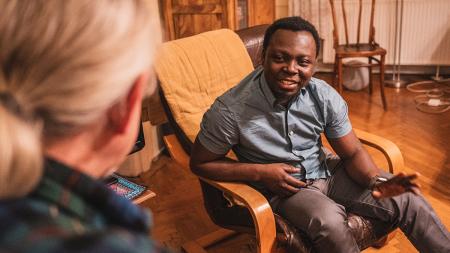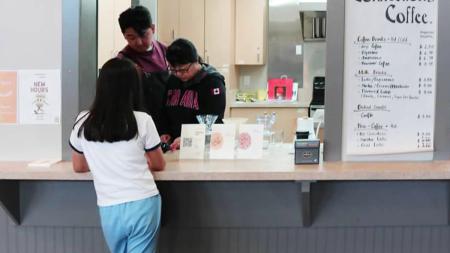CRCNA Group Learns from Christians Working for Peace in the Middle East

Left to right: Shannon Jammal-Hollemans, Kevin and Anna Kornelis ( CRC members who are currently teaching in Bethlehem), Reggie Smith and Colin Watson, Sr.
One of the lessons Rev. Shannon Jammal-Hollemans learned on a recent trip with two other Christian Reformed Church in North America representatives to the Middle East was that trying to maintain your Christian faith, especially in places where people are facing oppression, can be very difficult.
Jammal-Hollemans is the racial justice team leader for the CRC offices of Social Justice and Race Relations. On the trip to Egypt, Israel, the West Bank, and Lebanon she traveled with Rev. Reggie Smith, director of the offices of Social Justice and Race Relations, and Colin Watson, Sr., the CRC’s director of ministries and administration.
Speaking about their visit to Egypt, Jammal-Hollemans said, “Many Christians in Egypt want to leave because of social pressure and the economic situation.”
At the same time, in Egypt and elsewhere, the group witnessed important examples of Christians at work. They also saw how Muslims are working to seek peaceful solutions to current challenges in these countries.
“We in North America have no idea what it is like for Christians from a Muslim background in some of these countries,” said Smith. “I was so impressed by the incredible courage and conviction a lot of these individuals are showing. I learned a lot from the stories I heard.”
The goal of the trip, which was made possible by a grant, was for CRCNA leaders to gain a better understanding of the issues facing people, especially Christians, in the Middle East in order to determine ways that the denomination, and the Office of Social Justice in particular, can respond to the needs of those who are living there.
Watson said the trip “heightened our understanding” of the issues facing people in the area. He also commented that the trip was a response to Synod 2017’s action that “recommitted the CRCNA to ‘endorse and support a renewed and revised multiple agency, collaborative program that would build on our existing ministry capacities’ and to ‘increase our understanding of the root and systemic causes of hunger, poverty, oppression, and injustice’” (see Acts of Synod 2017, p. 633).
A highlight for the group in Egypt was the chance to speak with a superintendent who oversees the 24 schools of the Evangelical Presbyterian Church in Egypt. The schools serve some 35,000 students, 60 percent of whom are Muslim and 40 percent of whom are Christian.
“Every school has a small chapel and a small mosque to serve their students,” said Jammal-Hollemans. “They seek to plant the love and values of Christ in their students, Christian and Muslim, because they know that these are the future leaders of their country.”
As part of the trip, the group met with Resonate Global Mission partners and with Churches for Middle East Peace to visit and speak with people in Israel and the West Bank. While there, they had the chance to attend a lunch in Ramallah and to briefly meet with Palestinian President Mahmoud Abbas, whose organization coordinated the lunch.
In Israel, the CRCNA delegation met with U.S. Consul General Donald Blome as well as a representative from the United Nations Office for the Coordination of Humanitarian Affairs, which mobilizes resources and coordinates relief efforts. The UN representative briefed them on the situation in Gaza, an area closed off to international visitors.
They learned, said Jammal-Hollemans, that 2 million Palestinians live in Gaza, 54 percent of whom are under the age of 18. Some 70 percent of the population rely on international assistance, and 70 percent of the population are refugees from elsewhere. Many of the people don’t have enough food to eat, and there is 44 percent unemployment in Gaza.
“Gaza is in horrible shape. People can’t leave Gaza because it is walled in,” said Smith. “It is isolated, and there is a limit on the organizations that can work there.”
In Israel, the visitors also spoke with Israeli advocates for peace. For example, they met with Daniel Seidemann, an attorney who has worked for many years to seek a peaceful resolution to the Israeli-Palestinian conflict. Seidemann is considered an expert on Jerusalem.
They also met with Sahar Vardi, coordinator of the American Friends Service Committee’s Israel program in east Jerusalem.
“Vardi refused to serve in the Israeli military because of the occupation, and she served three months in prison for doing so. She practices non-violent resistance to the occupation as a way to disarm Israeli militarism,” said Jammal-Hollemans.
Later, the group met Archbishop Theodosios Atallah Hanna, Greek Orthodox Patriarchate of Jerusalem, who continues to grieve over the reality that the Christian community is dwindling because of the Israeli occupation of the West Bank.
He asked for prayers for Israel and Palestine, saying, “For peace to be achieved, we first need justice. If you want to see an end to Islamic radicalism, empower Christians in the Middle East.”
In Hebron, a city on the West Bank, the group met and had lunch with Ghassan Jabari, a young man who owns and operates a small business near the Ibrahimi Mosque, the historic burial site of Abraham, Sarah, Isaac, and Jacob.
He explained that life is difficult because of the presence of Israeli settlers. These settlers continue to move into the city, forcing long-time residents out. The Israeli military is also a constant presence, assigned to the area to protect the settlers.
“Jabari impressed us. He had a lot of hope, even in the midst of oppressive conditions,” said Jammal-Hollemans. “He is hopeful that things can get better and that the next generation will move things further along the road of reconciliation.”
In Bethlehem, which is surrounded by a wall, the travelers met with a CRC couple who are teaching at a Christian school there.
They also attended a gathering in Manger Square at which peace advocates — many from Great Britain — expressed their sorrow and asked forgiveness for their country’s role in the Balfour Declaration. That declaration, released 100 years ago this month, stated that the British government favorably viewed the formation of a Jewish homeland in Palestine.
In Lebanon, the last stop of their trip, the CRCNA group worshiped at Rabieh Evangelical Presbyterian Church in Beirut. They also met church and seminary officials who spoke about the ongoing work of building a Christian-Muslim dialogue.
“I was impressed by the ways that the Christian community in Lebanon is working for peace alongside their Muslim neighbors,” said Jammal-Hollemans.
Smith said he had a chance one evening to talk basketball with young Syrian refugees who are living in a church-run orphanage in Beirut. Many knew the names of U.S. basketball stars such Lebron James and Kobe Bryant.
“I came away thinking of how these kids have the same hopes and dreams as other kids. I also keep remembering the little guy who had to leave Syria and has no idea where his family is,” said Smith.
Upon returning home, Smith said it is important for Christians in North America to realize how much Christians in the Middle East are struggling as they seek peace in the midst of violence.
“These people we met are doing what the church has asked us all to do” — to bring hope and healing and the love of Christ to all people everywhere in the world, he said.


